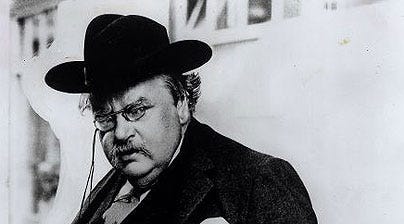Chesterton on Courage


by Marc Hays
G. K. Chesterton thrived on the unexpected turn: that twist in the story that set all that seemed normal on its head, thus showing that true north may sometimes be upside down because we were facing south to begin with, but didn’t know it. It comes as no surprise then, that Christianity’s paradoxes would bring him comfort and reassurance, rather than instilling angst and doubt. The following passage is from his book, Orthodoxy, Chapter VI, entitled “The Paradoxes of Christianity.”
“Granted that we all have to keep a balance, the real question comes in with the question of how that balance can be kept. That was the problem which Paganism tried to solve: that was the problem which I think Christianity has solved and solved in a strange way.
Paganism declared that virtue was in a balance; Christianity declared it was in a conflict: the collision of two passions apparently opposite. Of course they were not really inconsistent; but they were such that it was hard to hold simultaneously. Let us follow for a moment the clue of the martyr and the suicide; and take the case of courage. No quality has ever addled the brains and tangled the definitions of merely rational sages. Courage is almost a contradiction in terms. It means a strong desire to live taking the form of a readiness to die. “He that will lose his life, the same shall save it,” is not a piece of mysticism for saints and heroes. It is a piece of everyday advice for sailors and mountaineers. It might be printed in an alpine guide or a drill book. This paradox is the whole principle of courage; even of quite earthly and quite brutal courage. A man cut off by the sea will may save his life if he will risk it on the precipice. He can only get away from death by continually stepping within an inch of it. A soldier surrounded by enemies, if he is to cut his way out, needs to combine a strong desire for living with a strange carelessness about dying. He must not merely cling to life, for then he will be a coward, and not escape. He must not merely wait for death, for then he will be a suicide, and will not escape. He must seek his life in a furious indifference to it; he must desire life like water, and yet drink death like wine. No philosopher, I fancy, has ever expressed this romantic riddle with adequate lucidity, and I certainly have not done so. But Christianity has done more: it has marked the limits of it in the awful graves of the suicide and the hero, showing the distance between him who dies for the sake of living and him who dies for the sake of dying. And it has held up ever above the European lances the banner of the mystery of chivalry: the Christian courage, which is the disdain of death; not the Chinese courage which is the disdain of life.” (emphasis mine)
This excerpt is only one thought in a lengthy argument that Mr. Chesterton had with himself and was gracious enough to share with the world. We can all be forever thankful that Mr. G. S. Street issued Mr. Chesterton the challenge, and that Mr. Chesterton was prone to write a book with the slightest provocation.
Click on the cover for link to Amazon:

<>как вызвать поиск на странице
The post Chesterton on Courage appeared first on Kuyperian Commentary.

